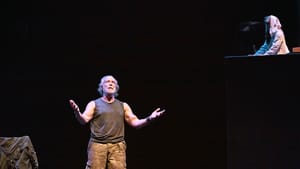Stay in the Loop
BSR publishes on a weekly schedule, with an email newsletter every Wednesday and Thursday morning. There’s no paywall, and subscribing is always free.
Homer, then and now
Pennsylvania Shakespeare Festival presents Lisa Peterson and Denis O’Hare’s An Iliad

The Pennsylvania Shakespeare Festival presents a modern-day stage adaptation of The Iliad at its DeSales University campus theater, with many similarities to and departures from the original text sure to interest Homer enthusiasts.
Directed by and starring Greg Wood, An Iliad is written by Lisa Peterson and Denis O’Hare, based on a translation of The Iliad by Robert Fagles. Wood narrates portions of the show while also portraying some of the poem’s principal characters, such as Achilles, Hector, King Priam, Agamemnon, and others. Liz Filios is the only other performer, giving the show additional life as a nonverbal muse and instrumentalist.
Throughout the show, the audience sees Wood at center stage, with Filios sitting on top of a high wall playing music.
Who was Homer?
The lore of The Iliad is that Homer sung it as a one-man show, but it should be noted that not all scholars believe that Homer actually existed. Some think he really was one man; others think a group of people created these works, or that Homer compiled and memorized the stories from an existing oral tradition.
Wood evokes the Homer of legend in his one-man performance, making the play similar to the original poem. But this version also differs from The Iliad.
Unlike the narrator of the original work, Wood’s narrator condemns war. He spews out the names of most wars that were fought throughout history, including the US’s recent wars in Afghanistan and Iraq. He sounds preachy. Although The Iliad displays horrific battlefield scenes, Homer (or whoever originally chanted and then wrote down the famous words) merely presents events without public condemnation.
It sounds as though An Iliad tells the audience how they should feel about war. Wood’s narrator dwells on that point, while The Iliad presents the situation and then lets the readers and audiences decide for themselves how to feel about war.
Another textual difference, which also weakens the story, comes when this narrator says he is not going to tell the audience how Achilles died, nor about Odysseus’s 10-year struggle to get home, nor about how Agamemnon’s wife Clytemnestra killed her husband immediately after he returned from the Trojan war. There was no need for The Iliad’s original teller to say any of that, because most people well versed in Greek mythology already know that Paris kills Achilles, and that Poseidon tries to keep Odysseus from reaching his homeland of Ithaca.
Discovering and remembering
Filios’s musical performance enhances the play, falling in line with how Wood speaks on stage. When he speaks sadly, we hear sad music, and when he speaks angrily, the music is loud and sometimes raucous. The show might have been harder to sit through with just the sound of Wood’s words, without hearing anything else.
This adaptation feels current, with the mention of contemporary wars, and the narrator’s naming of American cities. The script uses American geography to demonstrate to the audience just how far and wide were the homelands of the Greeks who fought in the Trojan War.
Wood’s performance isn’t flawless, but his portrayal of various characters is entertaining. Someone unfamiliar with The Iliad would learn a great deal about this poem in the PSF audience. And people who know the story should still see it because it will help them remember significant details about the work.
My personal problems with this adaptation might not bother other Iliad fans. But as a longtime reader of the work, I felt irked at times by the inconsistencies between this play and the poem. I saw it as straying from the text, but others might simply enjoy Wood’s dynamic presence on stage.
What, When, Where
An Iliad. By Lisa Peterson and Denis O’Hare, based on a translation of Homer’s The Iliad by Robert Fagles. Directed by Greg Wood. Through August 1, 2021, at the Pennsylvania Shakespeare Festival’s Main Stage, 2755 Station Avenue, Center Valley, PA. (610) 282-WILL or pashakespeare.org.
An Iliad is available to attend in person, or via livestream.
Accessibility
There will an audio-described and open-caption performance of An Iliad on Wednesday, July 28, at 6:30pm. Find more info about accessibility on the PSF website.
Sign up for our newsletter
All of the week's new articles, all in one place. Sign up for the free weekly BSR newsletters, and don't miss a conversation.

 David Block
David Block